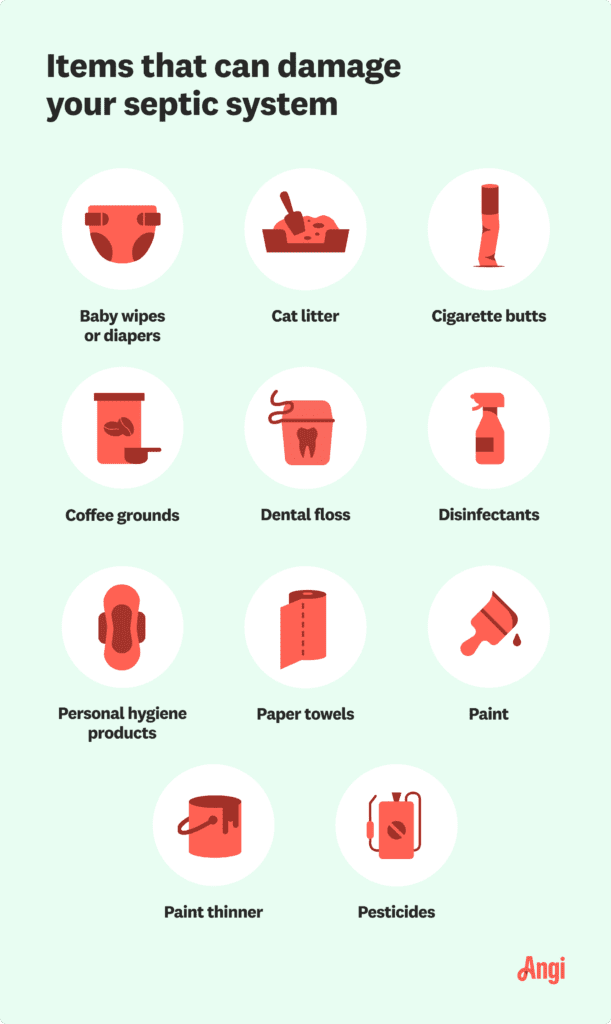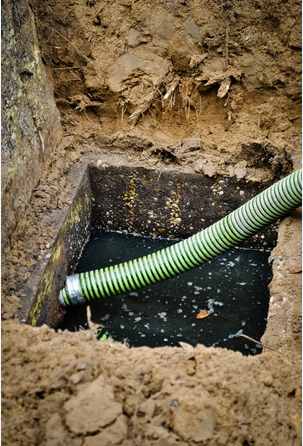If you’re wondering how to prolong the life of your septic tank, you’re in the right place. Maintaining a healthy septic system is crucial for the well-being of your home and the environment. In this article, we will explore simple yet effective tips that will help you ensure the longevity of your septic tank, saving you both time and money in the long run. So, let’s dive in and discover how you can keep your septic system running smoothly for years to come.

Understanding Your Septic Tank System
What is a septic tank?
A septic tank is an underground container that collects and treats wastewater from your household. It is typically made of concrete, fiberglass, or plastic and is designed to hold and separate solid waste from liquids. As wastewater flows into the septic tank, solid waste settles at the bottom while oils and greases float to the top. The liquid in the middle, known as effluent, is then discharged into a drainfield for further treatment and absorption into the soil.
Components of a septic tank system
A septic tank system consists of several key components that work together to treat and dispose of wastewater. These components include the septic tank itself, inlet and outlet pipes, a distribution box, and a drainfield. The septic tank is the primary holding and treatment facility, while the pipes and distribution box help distribute the effluent evenly to the drainfield. The drainfield, also known as the leach field, is where the effluent is further treated and absorbed into the soil.
How does a septic tank work?
The functioning of a septic tank can be broken down into three main stages: separation, digestion, and absorption. In the separation stage, solid waste settles at the bottom of the tank, while oils and greases float to the top. The liquid portion in the middle, known as effluent, is then transferred to the digestion stage, where bacteria and other microorganisms break down and treat the wastewater. Finally, the treated effluent is transported to the drainfield for absorption into the soil.
Importance of proper maintenance
Proper maintenance of your septic tank system is crucial to ensure its longevity and functionality. Neglecting maintenance can lead to expensive repairs, environmental contamination, and potential health hazards. Regular inspections, pumping, and adherence to proper waste disposal practices are essential for keeping your septic tank system in good working condition. By investing some time and effort into maintenance, you can save money in the long run and enjoy the benefits of a well-maintained septic system for years to come.
Regular Inspections and Pumping
How often should you inspect your septic tank?
Regular inspections are crucial for detecting any issues with your septic tank system before they escalate into costly repairs. As a general guideline, septic tank inspections should be conducted every three to five years by a professional septic tank service provider. However, certain factors may warrant more frequent inspections. If you have a larger household, use water-intensive appliances, or notice any warning signs of septic system problems, it is advisable to schedule inspections more frequently.
Signs that your septic tank needs pumping
Regular pumping is essential to prevent the buildup of solid waste in your septic tank, which can lead to clogs, backups, and system failure. While the recommended pumping frequency varies depending on factors like tank size and household water usage, there are some signs that indicate your septic tank may need pumping sooner rather than later. These signs include slow drains, foul odors, gurgling sounds, sewage backups, and excessive wastewater pooling in your yard. If you notice any of these signs, it is best to consult a professional to assess the need for pumping.
Finding a professional septic tank service provider
When it comes to inspecting, pumping, and maintaining your septic tank system, it is crucial to work with a reputable and experienced professional. Look for a septic tank service provider who is licensed, insured, and knowledgeable about local regulations and guidelines. It is also helpful to seek recommendations from friends, neighbors, or local community forums to find reliable providers with a track record of excellent service. Remember, investing in professional maintenance is a wise choice to ensure the longevity and proper functioning of your septic tank system.

Proper Waste Disposal Practices
What not to flush down the toilet or drains
To avoid clogs, backups, and system malfunctions, it is essential to be mindful of what you flush down your toilet or drains. Items that should never be flushed include feminine hygiene products, diapers, cigarette butts, paper towels, dental floss, cat litter, medications, and grease. These non-biodegradable items can accumulate in your septic tank, causing blockages and reducing its efficiency. Instead, dispose of these items in the garbage or designated recycling containers.
Using a garbage disposal with a septic tank
If your household uses a garbage disposal, it is important to note that the food waste it generates can have an impact on your septic tank system. While modern garbage disposals are designed to grind food waste into smaller particles, it is still recommended to minimize the use of the disposal for items like fibrous vegetables, coffee grounds, and large quantities of meat or fat. Excessive food waste can overload your septic system and contribute to clogs and backups.
Proper disposal of household chemicals
Household chemicals such as pesticides, cleaning agents, paint thinners, and solvents should never be disposed of down the drains or flushed down the toilet. These chemicals can disrupt the natural bacterial balance in your septic tank and harm the surrounding environment. Instead, dispose of them according to local waste management guidelines or take them to designated collection points. Opting for eco-friendly and septic-safe cleaning products can also help minimize the impact on your septic tank system.
Water Conservation
Effects of excessive water usage on septic systems
Excessive water usage can put a strain on your septic tank system and lead to its premature failure. When too much water enters the system, the natural digestion and treatment processes may not occur effectively, as the water volume overwhelms the tank’s capacity. This can result in reduced treatment efficiency, backups, and potential overflow. Additionally, excessive water may saturate the drainfield, preventing proper absorption and causing it to become less effective over time.
Tips for conserving water in your household
Conserving water not only benefits the environment but also helps maintain the health and functionality of your septic tank system. Some simple yet effective water conservation tips to follow include fixing leaky faucets and toilets promptly, installing low-flow fixtures, taking shorter showers, only running full loads in dishwashers and washing machines, and watering lawns and gardens during non-peak hours. By practicing these habits, you can reduce water usage and alleviate strain on your septic tank system.
Importance of spreading out water usage
To ensure the optimal performance of your septic tank system, it is advisable to spread out water usage throughout the day. Avoid having multiple high-water-usage activities, such as laundry and showers, happening simultaneously. Spacing out these activities allows the septic tank to effectively process and recycle the wastewater, reducing the risk of overload and increasing its lifespan. By being mindful of your water usage patterns, you can maintain a healthy balance within your septic system.

Avoiding Clog and Blockage Issues
Septic-safe toilet paper and cleaning products
Choosing septic-safe toilet paper and cleaning products is crucial for preventing clogs and blockages in your septic tank system. Regular toilet paper breaks down easily and is suitable for septic systems, while thicker and stronger options can accumulate over time, leading to clogs. Similarly, opt for septic-safe cleaning products that are biodegradable and do not contain harsh chemicals that can harm the beneficial bacteria in your septic tank. Always look for labels indicating “septic-safe” or “safe for septic systems.”
Preventing grease and oil buildup
Proper disposal of grease and oil is essential to prevent clogs and blockages in your septic tank system. Avoid pouring cooking oil, fat, or grease down the drain, as they can solidify and accumulate in the pipes and septic tank. Instead, let them cool and solidify in a container and dispose of them in the garbage. Wiping greasy dishes and pans with paper towels before washing them can also help minimize the amount of grease entering your septic system.
Avoiding planting trees or plants near septic tank components
While trees and plants can enhance the aesthetic appeal of your yard, it is important to exercise caution when planting them near septic tank components. The root systems of certain trees and plants can infiltrate and damage pipes, drains, and the septic tank itself, leading to blockages, leaks, and costly repairs. Before planting anything, consult with a professional to ensure a safe distance from septic system components and to choose septic-friendly vegetation for your yard.
Maintaining Your Drainfield
Understanding the role of drainfields
The drainfield, also known as the leach field, is a vital part of your septic tank system. Once the effluent is treated in the septic tank, it flows into the drainfield, where it is further treated and absorbed into the soil. The drainfield consists of a network of perforated pipes buried in trenches filled with gravel or other approved materials. The soil acts as a natural filter, removing harmful bacteria and pathogens from the effluent before it reaches the groundwater.
How to prevent damage to the drainfield
Keeping your drainfield in good condition is crucial for the proper functioning of your septic tank system. To prevent damage to the drainfield, avoid parking vehicles or heavy machinery over it, as the weight can compress the soil and damage the pipes. Ensure the drainfield is protected from excessive water runoff from roofs, driveways, or landscaping, as this can saturate the soil and hamper its ability to absorb and treat the effluent. Regular inspections and prompt repairs of any signs of damage or issues are also essential for maintaining a healthy drainfield.
Signs of drainfield problems and solutions
Identifying and addressing drainfield problems early can prevent significant damage and costly repairs. Signs of drainfield issues include swampy or excessively wet areas above the drainfield, foul odors in your yard, slow-draining sinks or toilets, and sewage surfacing above the drainfield. If you notice any of these signs, it is important to contact a professional septic tank service provider for an inspection. Depending on the severity of the issue, solutions may range from simple repairs or adjustments to drainfield maintenance or, in extreme cases, drainfield replacement.

Protecting Your Septic Tank During Winter
Insulating septic tank components
Winter weather poses unique challenges for septic tank systems, but with proper insulation, you can protect your system from freezing temperatures. Insulating the septic tank and pipes can help retain heat and prevent the contents from freezing. This can be done by wrapping insulation blankets or foam sleeves around exposed pipes and using insulation materials or covers designed specifically for septic tanks. It is important to insulate all exposed components, including the lid of the septic tank, to minimize the risk of freezing.
Preventing frozen pipes and backups
Frozen pipes can lead to backups and potential damage to your septic tank system. To prevent frozen pipes, ensure that all exposed pipes are properly insulated. Additionally, avoid diverting excessive water discharge from appliances directly into the septic tank during winter, as this can overwhelm the system and increase the risk of freezing. Conserving water usage and keeping the system warm by using insulation, heat tape, or even placing straw or mulch over the exposed components can help prevent freezing issues.
Winter maintenance tips for your septic system
Proper maintenance during winter is crucial to keep your septic tank system running smoothly. Avoid compacting the soil above the drainfield with heavy snow or vehicles, as this can hamper its ability to treat effluent properly. Remove snow and ice from the septic tank lid to ensure easy access for inspections or pumping. Do not use salt or chemical deicers near the septic system, as they can harm the beneficial bacteria. Additionally, promptly address any plumbing leaks or issues to prevent excess water from entering your septic system during winter.
Educate Household Members
Providing knowledge about septic system usage
Educating all household members about the proper usage and maintenance of the septic system is essential for its longevity. Make sure everyone understands what can and cannot be flushed or poured down the drains. Emphasize the importance of conserving water and spreading out high-water-usage activities. Encourage the use of septic-safe cleaning products and the proper disposal of household chemicals. By arming everyone with the necessary knowledge, you can collectively contribute to the well-being and longevity of your septic tank system.
Teaching proper cleaning and maintenance habits
In addition to understanding usage guidelines, it is crucial to instill proper cleaning and maintenance habits in your household. Teach everyone to report any signs of plumbing issues, such as slow drains or unusual odors, to avoid delays in addressing potential problems. Encourage regular inspections and pumping as recommended by professionals. Remind everyone about the importance of maintaining proper waste disposal practices and spreading out water usage. By fostering these habits, you can reduce the risk of septic system issues and ensure its optimal performance.
Creating awareness of potential issues
Creating awareness about potential septic system issues can help household members detect problems early on and take appropriate action. Make sure everyone is familiar with the signs of septic tank or drainfield issues, such as slow drains, foul odors, or sewage backups. Encourage open communication and regular discussions about the septic system, addressing any concerns or questions that may arise. By involving all household members in the process, you can foster a sense of shared responsibility and create a proactive approach towards septic system maintenance.

Keeping Records and Documents
The importance of keeping records
Maintaining accurate records and documents related to your septic tank system is essential for effective maintenance and troubleshooting. These records serve as a valuable resource for tracking the history of inspections, pumpings, repairs, and any other maintenance activities. They also provide crucial information for future professionals who may be working on your system. By keeping comprehensive records, you can ensure that your septic tank system receives proper care and attention and avoid potential issues that may arise from incomplete or inaccurate information.
Documents to maintain for your septic tank system
When it comes to keeping records for your septic tank system, there are several important documents to maintain. These include permits or construction plans related to the installation of your septic system, as well as any subsequent modifications or repairs. Keep a record of all inspections, pumpings, and maintenance activities, along with any relevant notes or recommendations from professionals. Additionally, it is advisable to keep receipts or invoices for services rendered, providing a clear timeline of maintenance activities and associated costs.
Organizing and storing records effectively
Effective organization and storage of your septic tank system records ensure easy access and retrieval whenever needed. Consider creating a dedicated folder or binder specifically for septic system records. Label each document clearly, including the date, type of service, and professional provider. Arrange the records in chronological order, making it convenient to track the history of maintenance activities. If preferred, digitalize the documents and back them up either on a secure cloud service or an external storage device. Regularly update your records as new inspections, pumpings, or repairs occur to maintain accuracy.
Professional Maintenance vs. DIY
Advantages of professional maintenance
While there are certain maintenance tasks you can perform yourself, opting for professional maintenance offers multiple advantages. Professionals possess the expertise, experience, and specialized equipment necessary to conduct comprehensive inspections, pumpings, and repairs. They can detect potential issues early on, saving you from expensive repairs or replacements down the line. Professionals are also knowledgeable about local regulations and guidelines, ensuring that your septic tank system remains compliant. By investing in professional maintenance, you can have peace of mind knowing that your septic system is in capable hands.
Simple maintenance tasks you can do yourself
While professional maintenance is recommended, there are simple maintenance tasks you can perform yourself to supplement their efforts. Regularly inspect your home for signs of leaks or plumbing issues and promptly address any problems. Implement water conservation practices, such as fixing leaky faucets or installing low-flow fixtures. Be vigilant about proper waste disposal and educate household members about septic system usage guidelines. Additionally, follow recommended pumping frequencies and keep accurate records of maintenance activities. By actively participating in these tasks, you can contribute to the overall health and longevity of your septic tank system.
When to call a professional for assistance
It is important to know when it is best to call a professional for assistance with your septic tank system. If you encounter any complex plumbing issues, such as persistent backups or odors, it is advisable to seek professional help. Additionally, if you observe any signs of septic tank or drainfield problems, such as slow drains, sewage surfacing, or foul odors, contact a professional for an inspection. Regular inspections and pumpings should be conducted by professionals, as they have the knowledge and tools to ensure a thorough assessment and proper maintenance. When in doubt, it is always better to err on the side of caution and consult a professional for assistance.
In conclusion, understanding and properly maintaining your septic tank system is crucial for its longevity and functionality. Regular inspections and pumpings, coupled with proper waste disposal practices and water conservation habits, can significantly contribute to the health of your septic system. Taking steps to prevent clogs and blockages, maintaining the drainfield, and protecting your septic tank during winter are essential for uninterrupted operations. Educating household members, keeping accurate records, and knowing when to seek professional assistance complete the comprehensive maintenance approach. By following these guidelines and investing in proper maintenance, you can ensure the optimal performance and longevity of your septic tank system for years to come.
